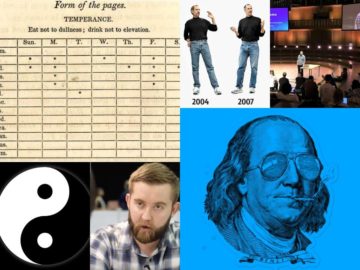Sometimes we are like dogs wanting to jump at any interesting movement that comes along. It’s often difficult to decide when we have many “good” opportunities to choose from. But you don’t want merely good ones, you’ll probably want just the great ones. Embrace the sober reality: we only have so much time in this world, though we sometimes behave as if it’s unlimited. So, choose wisely.
Fuel, Data, Intuition & Analysis
These are the primitives needed to make good decisions:
Fuel
Your “decision fuel” is your willpower. Or you could call it “decision-making focus”. There are numerous studies pointing to willpower as a limited resource. A clear mind is a prerequisite for good decisions. Simplifying your life to eliminate unnecessary decision making can help. This allows for more “fuel” or “ammo” to be allocated to the important decisions.
This is why some entrepreneurs choose to wear the same clothes every day, like cartoon characters. Steve Jobs did this in his heyday and, today’s Sergey Nazarov does it with his infamous blue flannel shirt. Obviously this is just one of many methods to reserve willpower. Clearing unnecessary decision making can be challenging, because you may have to say “no” many things and resist distraction.



Data
Your “data” is kind of self explanatory, they are the various factors that go into deciding. Sometimes we simply don’t have enough information to make a decision. In this case, you’ll need to either:
- Wait for more information to arise, before deciding
- Flip a coin, then error correct later.
- Use your intuition to decide
Intuition
Intuition can be described as something you feel in your “heart of hearts”. Another useful definition: “Intuition is a reflection of reasoning or information that is not immediately available to the intellect.”
Intuition is often conflated with irrationality. This is because intuition is closely tied to the subjective, “being” level. Why do some people prefer chocolate over vanilla? The color blue over the color green? You can always add reasoning to it, but at it’s core is a subjective preference. Something you can’t intellectualize, you just like it because that’s what you like!
It’s a Bayesian World of statistics. We’re not omniscient Gods. Knowing you’ll never acquire 100% of the information, you’ll have to make decisions with what you have. Handle uncertainty with grace. This is also where your intuition comes in.
Analysis
Once you believe you do have enough “data”, move on to the analysis. Endlessly churning away at your options to only arrive at a stalemate is a good way to drive yourself mad. Analysis paralysis. Ben Franklin made a good method for breaking this gridlock in decision making. His method can be found here.



Edge Cases
Crossing Paths

A confusing case is when the various paths to choose from have desired elements of one in the other, or could reinforce each other.
For example, Fred is a journeyman in a general field, and wants to move into one of many specializations. He has very limited time to dedicate once a week to classes or networking to decide which one he likes better. By enrolling in a course at college, there is a risk he finds he doesn’t like that particular specialization, and wasted valuable time and money. On the other hand, he could network with classmates and study at the same time. Conversely, networking enables some degree of learning, and could help him chose the right specialization from the start. The solution is to find which path has the most synergy, or “best of both worlds” weighting.
Another example might be deciding which business to start, where each option has similar steps or processes in their business plan. Thus, the ability to “pivot” for each choice might vary. Thus you will want to pick the one with the highest amount of pivotability.
Then, once again, run the above framework of Fuel, Data, Intuition & Analysis can be used.
Combination
Sometimes a combination of choices is optimal for you. Take care however, to be realistic about how much time you can allocate to the different choices. Does it fit your temperament? For example, does your personality fit juggling multiple projects? Are you refreshed or frustrated by task switching, etc. The next step is to drill down and determine the ratio of time to allocate to each project. Again, you can use the above primitives to help discern. In some cases you will be able to delegate one of your choices. The question then becomes, does the cost and distraction of overseeing/managing that delegation outweigh the benefits?


Leave a Reply